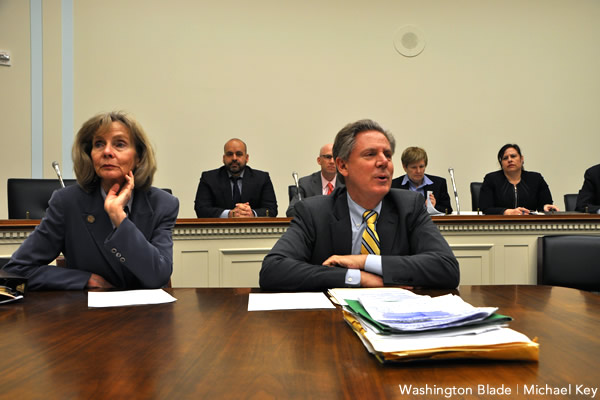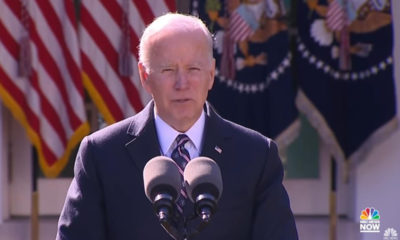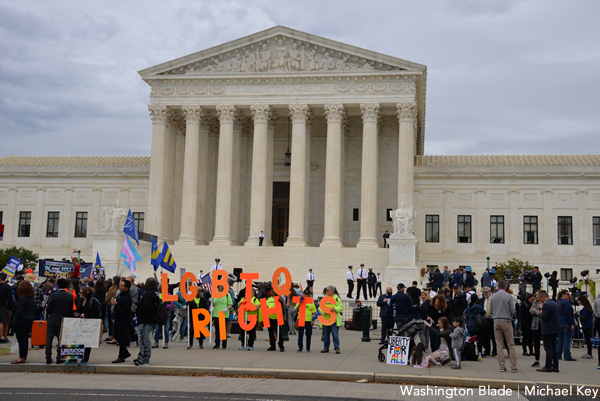National
110 House lawmakers call for ENDA executive order
Democratic leaders, Republicans absent from letter


Reps. Lois Capps and Frank Pallone (right) are among the 110 House Democrats calling on Obama to issue an ENDA executive order (Blade photo by Michael Key)
A total of 110 U.S. House members have signed a letter calling on President Obama to take action to protect LGBT workers from discrimination — although the letter has the notable absence of members of Democratic leadership and Republican lawmakers.
In a letter dated March 20, the lawmakers called on Obama to sign a much sought-after executive order requiring federal contractors to have non-discrimination protections for their LGBT workers.
“We believe that a fully inclusive America benefits us all and that sexual orientation and gender identity should never be used to discriminate in employment practices,” the letter states. “For that reason, we request that you make signing an executive order that would prohibit federal contractors from discriminating in the workplace based on an individual’s sexual orientation or gender identity an initial priority of your second term.”
A news statement accompanying the letter credits Reps. Frank Pallone (D-N.J.) and Jared Polis (D-Colo.), the most senior openly gay member of the U.S. House, with leading the 110 House members in the efforts. In 2011, Pallone led a similar effort with Rep. Lois Capps (D-Calif.) by circulating a letter that was signed by 72 House Democrats calling on Obama to issue the directive.
In addition to Polis, all six openly LGB members of the U.S. House signed the letter. The other five are David Cicilline (D-R.I.), Mark Takano (D-Calif.), Mark Pocan (D-Wis.), Sean Patrick Maloney (D-N.Y.) and Kirsten Sinema (D-Ariz.).
Tico Almeida, president of Freedom to Work, commended the House members who signed the letter for what he said was “speaking out to ensure American taxpayers do not subsidize discriminatory corporations where LGBT employees fear they will get fired for who they are or who they love.”
“It’s now time for President Obama to build on his impressive record and sign this executive order giving millions of Americans a fair shot to build a career based on their talent and hard work,” Almeida added.
The latest missive comes on the heels of similar letters that were sent to President Obama earlier this year. One was signed by 37 U.S. senators, the other was signed by 54 LGBT advocacy groups. In response to each letter, the White House has restated Obama’s support for the Employment Non-Discrimination Act, legislation that would protect LGBT people against workplace discrimination.
Shin Inouye, a White House spokesperson, echoed a similar sentiment in response to the latest letter.
“Regarding a hypothetical Executive Order on LGBT non-discrimination for federal contractors, I have no updates for you on that issue,” Inouye said. “The president has long supported an inclusive Employment Non-Discrimination Act and his administration will continue to work to build support for it.”
But the new letter from House members has notable absences. For one, no House Republicans are among the signers. Pallone’s office didn’t immediately respond to a request for comment on why House Republicans declined or if the lawmaker reached out to them.
The office of Rep. Ileana Ros-Lehtinen (R-Fla.), who’s considered the most pro-LGBT Republican member of Congress, also didn’t immediately respond to a request for comment on why her name was not on the list.
Also absent from the letter are key members of House Democratic leadership. House Minority Leader Nancy Pelosi (D-Calif.) isn’t among the signers, even though she’s already on the record in support of the directive. In July 2011, Pelosi affirmed to the Washington Blade she would support an executive order protecting LGBT workers from workplace discrimination, saying “Yes, and yes. I think it is all long overdue.”
Drew Hammill, a Pelosi spokesperson, said his boss supports the effort outlined in the letter, but as a rule doesn’t sign group letters because of her position as House minority leader.
“President Obama has demonstrated time and time again that he is committed to ending discrimination wherever it exists,” Hammill added. “Leader Pelosi supports this effort, but it does not diminish the need for a fully-inclusive ENDA law and a majority in the House to approve such legislation.”
Other members of Democratic leadership that are absent from the letter are House Democratic Whip Steny Hoyer (D-Md.), whose daughter came out as a lesbian in an interview with the Blade, as well as Assistant Democratic Leader Jim Clyburn (D-S.C.). Their offices didn’t respond to a request for comment either.
Another absent name is Democratic National Committee Chair Rep. Debbie Wasserman Schultz (D-Fla.). Last year, she told the Blade she represents “as a member of Congress one of the largest, most vibrant, gay communities in the entire country.” Her office also didn’t respond to a request for comment.
Federal Government
Lambda Legal praises Biden-Harris administration’s finalized Title IX regulations
New rules to take effect Aug. 1

The Biden-Harris administration’s revised Title IX policy “protects LGBTQ+ students from discrimination and other abuse,” Lambda Legal said in a statement praising the U.S. Department of Education’s issuance of the final rule on Friday.
Slated to take effect on Aug. 1, the new regulations constitute an expansion of the 1972 Title IX civil rights law, which prohibits sex-based discrimination in education programs that receive federal funding.
Pursuant to the U.S. Supreme Court’s ruling in the landmark 2020 Bostock v. Clayton County case, the department’s revised policy clarifies that discrimination on the basis of sexual orientation and gender identity constitutes sex-based discrimination as defined under the law.
“These regulations make it crystal clear that everyone can access schools that are safe, welcoming and that respect their rights,” Education Secretary Miguel Cardona said during a call with reporters on Thursday.
While the new rule does not provide guidance on whether schools must allow transgender students to play on sports teams corresponding with their gender identity to comply with Title IX, the question is addressed in a separate rule proposed by the agency in April.
The administration’s new policy also reverses some Trump-era Title IX rules governing how schools must respond to reports of sexual harassment and sexual assault, which were widely seen as imbalanced in favor of the accused.
Jennifer Klein, the director of the White House Gender Policy Council, said during Thursday’s call that the department sought to strike a balance with respect to these issues, “reaffirming our longstanding commitment to fundamental fairness.”
“We applaud the Biden administration’s action to rescind the legally unsound, cruel, and dangerous sexual harassment and assault rule of the previous administration,” Lambda Legal Nonbinary and Transgender Rights Project Director Sasha Buchert said in the group’s statement on Friday.
“Today’s rule instead appropriately underscores that Title IX’s civil rights protections clearly cover LGBTQ+ students, as well as survivors and pregnant and parenting students across race and gender identity,” she said. “Schools must be places where students can learn and thrive free of harassment, discrimination, and other abuse.”
Michigan
Mich. Democrats spar over LGBTQ-inclusive hate crimes law
Lawmakers disagree on just what kind of statute to pass

Michigan could soon become the latest state to pass an LGBTQ-inclusive hate crime law, but the state’s Democratic lawmakers disagree on just what kind of law they should pass.
Currently, Michigan’s Ethnic Intimidation Act only offers limited protections to victims of crime motivated by their “race, color, religion, gender, or national origin.” Bills proposed by Democratic lawmakers expand the list to include “actual or perceived race, color, religion, gender, sexual orientation, gender identity or expression, ethnicity, physical or mental disability, age, national origin, or association or affiliation with any such individuals.”
Democratic Gov. Gretchen Whitmer and Attorney General Dana Nessel have both advocated for a hate crime law, but house and senate Democrats have each passed different hate crimes packages, and Nessel has blasted both as being too weak.
Under the house proposal that passed last year (House Bill 4474), a first offense would be punishable with a $2,000 fine, up to two years in prison, or both. Penalties double for a second offense, and if a gun or other dangerous weapons is involved, the maximum penalty is six years in prison and a fine of $7,500.
But that proposal stalled when it reached the senate, after far-right news outlets and Fox News reported misinformation that the bill only protected LGBTQ people and would make misgendering a trans person a crime. State Rep. Noah Arbit, the bill’s sponsor, was also made the subject of a recall effort, which ultimately failed.
Arbit submitted a new version of the bill (House Bill 5288) that added sections clarifying that misgendering a person, “intentionally or unintentionally” is not a hate crime, although the latest version (House Bill 5400) of the bill omits this language.
That bill has since stalled in a house committee, in part because the Democrats lost their house majority last November, when two Democratic representatives resigned after being elected mayors. The Democrats regained their house majority last night by winning two special elections.
Meanwhile, the senate passed a different package of hate crime bills sponsored by state Sen. Sylvia Santana (Senate Bill 600) in March that includes much lighter sentences, as well as a clause ensuring that misgendering a person is not a hate crime.
Under the senate bill, if the first offense is only a threat, it would be a misdemeanor punishable by one year in prison and up to $1,000 fine. A subsequent offense or first violent hate crime, including stalking, would be a felony that attracts double the punishment.
Multiple calls and emails from the Washington Blade to both Arbit and Santana requesting comment on the bills for this story went unanswered.
The attorney general’s office sent a statement to the Blade supporting stronger hate crime legislation.
“As a career prosecutor, [Nessel] has seen firsthand how the state’s weak Ethnic Intimidation Act (not updated since the late 1980’s) does not allow for meaningful law enforcement and court intervention before threats become violent and deadly, nor does it consider significant bases for bias. It is our hope that the legislature will pass robust, much-needed updates to this statute,” the statement says.
But Nessel, who has herself been the victim of racially motivated threats, has also blasted all of the bills presented by Democrats as not going far enough.
“Two years is nothing … Why not just give them a parking ticket?” Nessel told Bridge Michigan.
Nessel blames a bizarre alliance far-right and far-left forces that have doomed tougher laws.
“You have this confluence of forces on the far right … this insistence that the First Amendment protects this language, or that the Second Amendment protects the ability to possess firearms under almost any and all circumstances,” Nessel said. “But then you also have the far left that argues basically no one should go to jail or prison for any offense ever.”
The legislature did manage to pass an “institutional desecration” law last year that penalizes hate-motivated vandalism to churches, schools, museums, and community centers, and is LGBTQ-inclusive.
According to data from the U.S. Department of Justice, reported hate crime incidents have been skyrocketing, with attacks motivated by sexual orientation surging by 70 percent from 2020 to 2022, the last year for which data is available.
Twenty-two states, D.C., Puerto Rico, and the U.S. Virgin Islands have passed LGBTQ-inclusive hate crime laws. Another 11 states have hate crime laws that include protections for “sexual orientation” but not “gender identity.”
Michigan Democrats have advanced several key LGBTQ rights priorities since they took unified control of the legislature in 2023. A long-stalled comprehensive anti-discrimination law was passed last year, as did a conversion therapy ban. Last month the legislature updated family law to make surrogacy easier for all couples, including same-sex couples.
A bill to ban the “gay panic” defense has passed the state house and was due for a Senate committee hearing on Wednesday.
Indiana
Drag queen announces run for mayor of Ind. city
Branden Blaettne seeking Fort Wayne’s top office

In a Facebook post Tuesday, a local drag personality announced he was running for the office of mayor once held by the late Fort Wayne Mayor Tom Henry, who died last month just a few months into his fifth term.
Henry was recently diagnosed with late-stage stomach cancer and experienced an emergency that landed him in hospice care. He died shortly after.
WPTA, a local television station, reported that Fort Wayne resident Branden Blaettne, whose drag name is Della Licious, confirmed he filed paperwork to be one of the candidates seeking to finish out the fifth term of the late mayor.
Blaettner, who is a community organizer, told WPTA he doesn’t want to “get Fort Wayne back on track,” but rather keep the momentum started by Henry going while giving a platform to the disenfranchised groups in the community. Blaettner said he doesn’t think his local fame as a drag queen will hold him back.
“It’s easy to have a platform when you wear platform heels,” Blaettner told WPTA. “The status quo has left a lot of people out in the cold — both figuratively and literally,” Blaettner added.

The Indiana Capital Chronicle reported that state Rep. Phil GiaQuinta, who has led the Indiana House Democratic caucus since 2018, has added his name to a growing list of Fort Wayne politicos who want to be the city’s next mayor. A caucus of precinct committee persons will choose the new mayor.
According to the Fort Wayne Journal Gazette, the deadline for residents to file candidacy was 10:30 a.m. on Wednesday. A town hall with the candidates is scheduled for 6 p.m. on Thursday at Franklin School Park. The caucus is set for 10:30 a.m. on April 20 at the Lincoln Financial Event Center at Parkview Field.
At least six candidates so far have announced they will run in the caucus. They include Branden Blaettne, GiaQuinta, City Councilwoman Michelle Chambers, City Councilwoman Sharon Tucker, former city- and county-council candidate Palermo Galindo, and 2023 Democratic primary mayoral candidate Jorge Fernandez.
-

 Africa4 days ago
Africa4 days agoCongolese lawmaker introduces anti-homosexuality bill
-

 District of Columbia1 day ago
District of Columbia1 day agoReenactment of first gay rights picket at White House draws interest of tourists
-

 World4 days ago
World4 days agoOut in the World: LGBTQ news from Europe and Asia
-

 Arizona1 day ago
Arizona1 day agoAriz. governor vetoes anti-transgender, Ten Commandments bill











